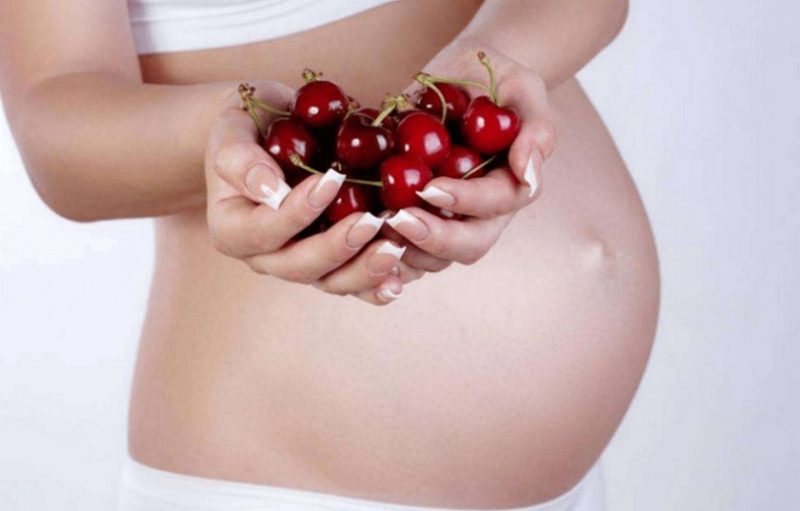Is it possible to eat cherries during pregnancy and how are they beneficial for the expectant mother and baby?
In the summer, when the body needs to stock up on vitamins, people try to eat more fresh vegetables, fruits and berries. This is especially important during pregnancy, since a woman provides useful substances not only to her body, but also to her unborn child. Cherries are considered a storehouse of vitamins and microelements. In this article we will tell you whether this berry can be eaten during pregnancy.
Can pregnant women eat cherries?

Cherries, a sour berry, are often desired by pregnant women, whose taste preferences often change under the influence of hormones. It is eaten not only fresh, but also in processed form: they make preserves, compotes, jams, fillings for pies and all kinds of desserts.
Cherries contain:
- vitamins of group B, A, C, E, PP;
- calcium;
- potassium;
- phosphorus;
- zinc;
- silicon;
- magnesium.
The calorie content of the berry is only 52 kcal per 100 g. This makes cherries an excellent dietary product.
The fruits have a lot useful properties:
- calcium strengthens bones, hair and skin;
- Coumarins, together with iron, normalize blood clotting, preventing the occurrence of thrombosis;
- anthocyanins strengthen the walls of blood vessels;
- ellagic acid exhibits antioxidant, anti-inflammatory and antitumor activity;
- folic acid is necessary for the healthy development of the unborn baby;
- potassium is involved in the conduction of nerve impulses, maintains water and acid-base balances;
- tannins have bactericidal, anti-inflammatory and astringent effects;
- pectins help cleanse the gastrointestinal tract (as they take on liquid, they turn into jelly);
- organic acids increase pancreatic secretion and normalize digestion;
- Vitamin C has a general strengthening and antioxidant effect.
In the early stages
The first trimester of pregnancy lasts from weeks 1 to 13. At this time, the expectant mother’s body really needs an additional source of vitamins that will help strengthen the body. Therefore, it is advisable to consume cherries daily during pregnancy if there are no contraindications.
Reference. In the early stages, regular consumption of cherries can prevent toxicosis. Fresh berries, eaten in the morning on an empty stomach, eliminate nausea and increase appetite.
If you include cherries in the diet in reasonable quantities in the early stages, the likelihood of abnormalities in fetal development is reduced. This is due to the presence of folic acid in the berry, which helps the formation and development of the embryo in the first trimester and prevents anemia in women. Vitamins C and group B increase the emotional stability of the mother and strengthen the immune system.
In the second trimester
With the beginning of the second trimester, the expectant mother needs to introduce more foods that contain potassium and calcium into her diet. They are necessary for strengthening bone tissue and normal functioning of the cardiovascular system. It is best to drink cherry juice, rich in minerals, at this time.
In the second trimester, the fetus actively grows, taking many minerals and vitamins from the mother’s body. During this period, a woman may experience hair loss and peeling nails. Cherries will improve the absorption of nutrients.
In the later stages
In later stages, a woman’s body changes greatly. The increase in mass interferes with normal movement, and the growing fetus puts pressure on the internal organs. Because of this, metabolic processes begin to stagnate.
Important! Cherries help remove excess fluid from the body, reducing swelling.
Eating cherries in the 3rd trimester of pregnancy helps relieve constipation, as the berry has a mild laxative effect.
The benefits and harms of cherries for the body of a woman and child

Thanks to the content of B vitamins in cherries woman while carrying a child, she is less susceptible to stress. Her hemoglobin level in the blood increases.
Zinc, magnesium and calcium improve blood circulation and prevent thrombosis. A whole complex of minerals contained in the berry strengthens the nervous system, eliminates insomnia and prevents cramps, which often occur in pregnant women.
Vitamin E in berries helps the development and growth of the child, increases the protective functions of the mother’s body, exhibits antioxidant and antihypoxic properties.
Folic acidand has a positive effect on the intrauterine development of the embryo. Thanks to this substance, the child's neural tube is formed.
Vitamin A promotes the synthesis of many essential proteins.
This is interesting:
Should you eat chokeberry during pregnancy?
Is it possible to eat watermelon during early and late pregnancy?
Why do you crave potatoes during pregnancy and is it possible to eat them?
Rules of use
Before introducing even the healthiest berry into a pregnant woman’s diet, it is important to prepare the body. At first, consume no more than 5 berries per day.Such precaution is required to be sure that cherries will not cause an allergic reaction and will not have a negative effect on the body.
After this, the berries are consumed 150–200 g fresh or 200 ml in the form of juice. It is permissible to drink no more than 500 ml of fresh cherry compote per day.
It is better to eat cherries fresh or make juice from them, although the methods of consumption are very varied, since cherries are included in a large number of dishes. The berry is used in:
- drinks;
- baking;
- jams;
- compotes
Cherries contain fat-soluble vitamin A, so they can be eaten with cottage cheese or cream.
How to select and store berries

Ripe berries have a sweet and sour taste, the stone is easily separated from the pulp, there are no spots or signs of rot.
It is better to buy cherries that have been picked along with the petioles. This indicates that they were not frozen. It is not recommended to purchase limp and sticky fruits.
Important! If the berries have dark or dry stems, they are not fresh.
Fresh berries are kept in the refrigerator for 4 days. For long-term storage they are frozen:
- Damaged and rotten cherries are sorted, washed and dried.
- Place in plastic containers and cover with lids.
- Sent to the freezer.
Frozen fruits remain fresh for 6 months.
Contraindications
With cherries, as with other products, you should not go to extremes. Pregnancy does not involve consuming even healthy foods in huge quantities. This will only harm the expectant mother.
Contraindications:
- Allergy. Some pregnant women experience allergic reactions to certain foods. In this case, it is better to replace the cherry with another berry or fruit.
- Diseases of the gastric mucosa and problems with the duodenum. The berry increases acidity, which is why there is a possibility of exacerbation of ulcers and gastritis.
Cherry seeds contain amygdalin, a substance that decomposes in the intestines to form toxic hydrocyanic acid. When poisoned, malfunctions occur in the central nervous system, kidneys and heart. Therefore, compotes and jams with seeds that have been stored for a long time can be dangerous.
Conclusion
Cherry is a very healthy berry, including for pregnant women. If you take into account contraindications and follow the permissible consumption rate, it will only benefit the mother and child. Low calorie content allows the fruits to be used for dietary nutrition.